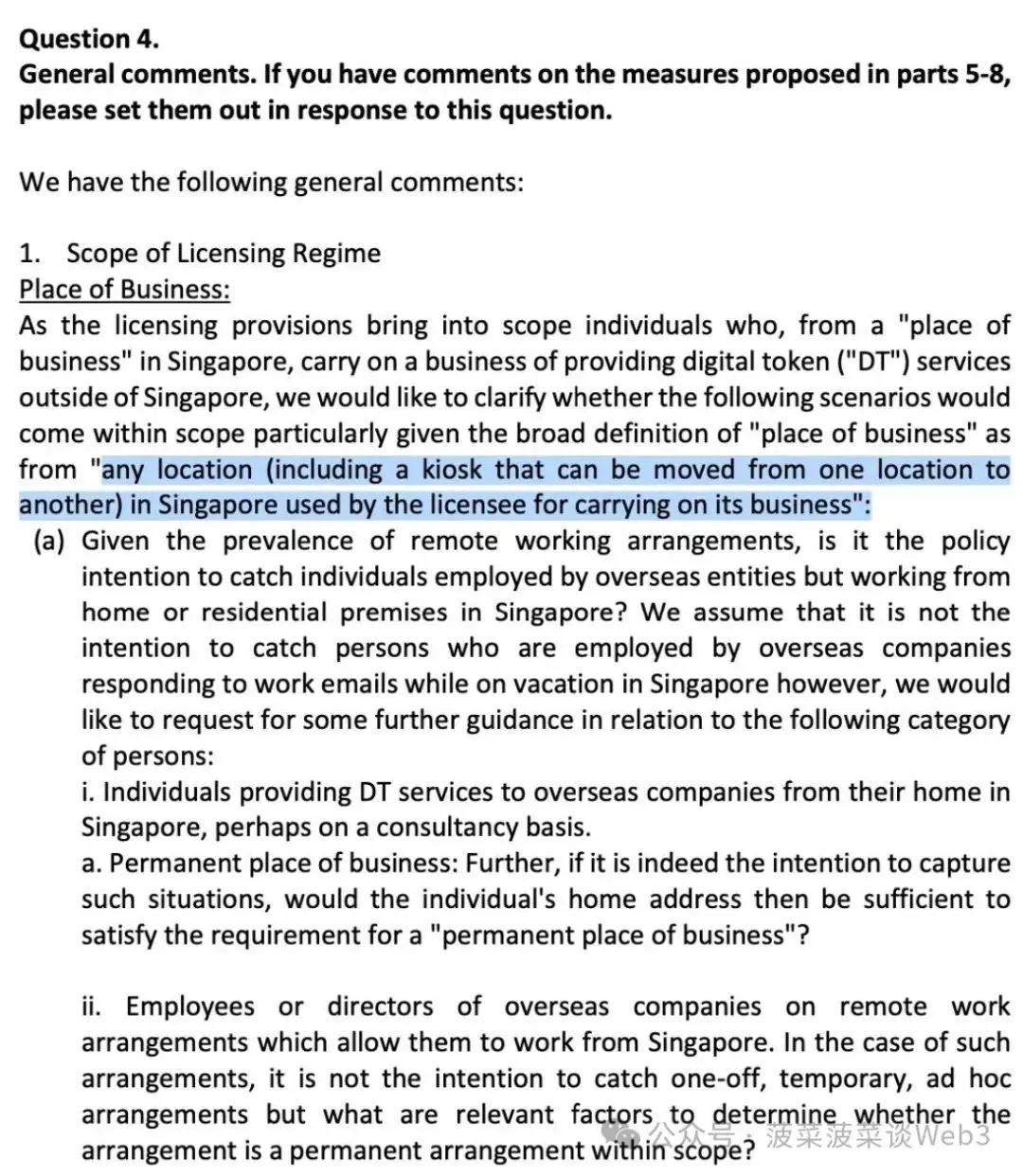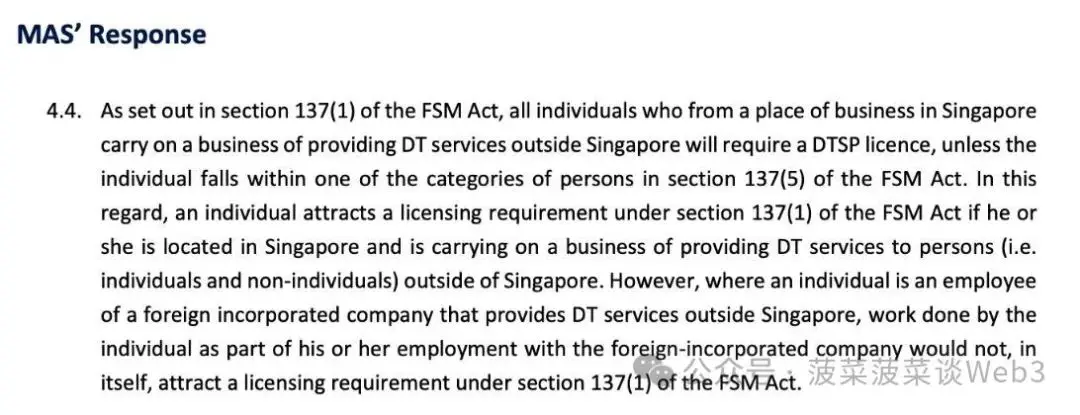Author: Spinach Spinach Talks Web3
On May 30, 2025, the Monetary Authority of Singapore (MAS) released a response document regarding the new regulations for Digital Token Service Providers (DTSP), and many have yet to realize that this will actually impact the entire Web3 industry landscape in Asia.
The new regulations will officially take effect on June 30, 2025, and MAS has made it clear that there will be no grace period! A large-scale "Singapore Web3 exodus" may have quietly begun.
"We will be extremely cautious." As MAS expressed this attitude unabashedly in this stern consultation document, Singapore, once hailed as the "crypto-friendly paradise of Asia" by global Web3 practitioners, is bidding farewell to the past in a surprising manner—not through gradual policy adjustments, but through an almost "cliff-like" tightening of regulations.
For those projects and institutions still on the sidelines, it may no longer be a question of "whether to leave," but rather "when to leave" and "where to go."
Former Glory: The Golden Age of Regulatory Arbitrage
Do you remember Singapore in 2021? When China completely banned cryptocurrency trading and the U.S. SEC waved its regulatory stick, this small island nation opened its arms to welcome Web3 entrepreneurs. Three Arrows Capital, Alameda Research, FTX Asia headquarters… one after another, prominent names chose to settle here, not only because of the 0% capital gains tax but also due to the "embracing innovation" stance exhibited by MAS at that time.
Back then, Singapore was regarded as the "holy land of regulatory arbitrage" in the Web3 industry. By registering a company here, one could legally and compliantly provide digital asset services to global users outside of Singapore while enjoying the reputation of Singapore as a financial hub. This "being in Singapore, but focusing on the world" business model once attracted countless Web3 practitioners.
Now, however, Singapore's new DTSP regulations mean that Singapore has completely closed the door on regulatory friendliness, and the attitude can be summed up in one sentence: drive out all those in the Web3 industry without a license from Singapore.
What is DTSP? A Definition That Is "Chillingly" Concerning
DTSP stands for Digital Token Service Provider. According to the definition in Section 137 of the FSM Act and the content of Document 3.10, DTSP includes two types of entities:
- Individuals or partnerships operating in a business location in Singapore;
- Singapore companies conducting digital token service business outside of Singapore (regardless of whether the company is from Singapore or elsewhere).

This definition seems simple but hides significant risks.
First, what is the definition of "business location" in Singapore? MAS defines "business location" as "any location in Singapore used by a licensee to conduct business (including stalls that can move from one location to another)."
Note several key points in this definition:
- "Any location": There is no restriction that it must be a formal business site.
- "Including stalls": Even mobile stalls are included, showing the broad scope of regulation.
- "Used to conduct business": The key is whether business activities are conducted at that location.
In simple terms, as long as you are unlicensed in Singapore, engaging in any business involving digital assets at any location carries the risk of legal violation, regardless of whether you are a local Singapore company or an overseas company, and regardless of whether you are targeting local or overseas clients.
So, would working from home be illegal?
In response to this question, Baker McKenzie law firm submitted feedback to MAS.

Baker McKenzie specifically sought clarification from MAS on this issue:
"Given the prevalence of remote work, does MAS intend for its policy to cover individuals employed by overseas entities but working from home or residential locations in Singapore?"
The law firm's concerns are quite realistic. They listed several potential pitfalls:
- Individuals providing DT services from home for overseas companies (possibly of a consulting nature).
- Employees or directors of overseas companies working in Singapore under remote work arrangements.
However, the law firm also attempted to provide some "protection" for remote workers:
"Based on the drafting of current legislation, it can be argued that home or residential locations should not be included, as these locations are generally not understood as places where licensees conduct business."
Nevertheless, MAS poured cold water on this issue:
"According to Section 137(1) of the Financial Services and Markets Act, all individuals engaging in digital token service business from a business location in Singapore to persons outside of Singapore are required to obtain a DTSP license, unless that individual falls under a category specified in Section 137(5) of the Financial Services and Markets Act. In this regard, if an individual is located in Singapore and engages in providing digital token services to persons outside of Singapore (i.e., individuals and non-individuals), that individual is required to apply for a license under Section 137(1) of the Financial Services and Markets Act. However, if the individual is an employee of a foreign-registered company providing digital token services to persons outside of Singapore, the work that the individual engages in as part of their employment with the foreign-registered company will not trigger the licensing requirements under Section 137(1) of the Financial Services and Markets Act."
And
"However, if these individuals work in shared office spaces or in the offices of affiliated companies of overseas entities, they are clearly more likely to fall within the scope."

To summarize the new regulations:
- Without a license, neither individuals nor companies may conduct business targeting local or overseas clients at any business location in Singapore.
- If you are an employee of an overseas company, working from home is acceptable.
However, the new regulations also have many ambiguous areas:
- MAS's definition of employees is very vague; whether project founders count as employees, and whether holding shares counts as being an employee, is determined by MAS.
- If you are a BD or sales representative for an overseas company and you go to someone else's shared office to conduct business, does that count as conducting business at a business location? MAS decides.
Ambiguous Definition of Digital Token Services, KOLs May Also Be Affected?
MAS's definition of digital token services is astonishingly broad, covering almost all related token types and services. It even includes the publication of research reports?
According to item (j) of the first schedule of the FSM Act, the regulatory scope includes:

"Any service related to the sale or offer of digital tokens, including: (1) providing advice related to digital tokens directly or through publications, articles, or any form (electronic, print, or otherwise), or (2) providing advice related to digital tokens through the publication or dissemination of research analysis or research reports (electronic, print, or otherwise)."
This could mean that if you, as a KOL or institution, publish a report analyzing the investment value of a certain token in Singapore, theoretically, you may need a DTSP license; otherwise, you could be deemed illegal.
The Blockchain Association of Singapore posed a soul-searching question to MAS regarding this issue:
"Will traditional research reports be deemed related to the sale or offer of tokens? How should participants distinguish research reports related to the sale or offer of tokens?"
MAS did not provide a clear answer, and this ambiguity leaves all content creators walking on thin ice.
Which Groups May Be Affected?
Individual Identity Types (High Risk)
Independent Practitioners: Including developers, project consultants, market makers, miners, etc.
Content Creators and KOLs: Including analysts, KOLs, community operators, etc.
Core Project Personnel: Including founders, BD, sales, and other core business personnel.
Institution Types (High Risk)
Unlicensed Exchanges: CEX, DEX.
Project Parties: DeFi, wallets, NFTs, etc.
Conclusion: The End of the Regulatory Arbitrage Era in Singapore
A terrifying reality emerges: Singapore is serious this time, aiming to "drive out" all non-compliant individuals. As long as one is non-compliant, almost any activity related to digital tokens may fall under regulatory scrutiny. Whether you are in a luxurious office building or on your home sofa, whether you are a CEO of a large company or a freelancer, as long as it involves digital token services.
Due to the significant gray areas and vague definitions surrounding "business location" and "conducting business," MAS is likely to adopt a "case-oriented" enforcement strategy—first taking down a few to warn the rest.
Thinking of temporarily embracing compliance? Sorry, MAS has made it clear that it will review DTSP license applications with "extreme caution," and approvals will only be granted in "extremely limited circumstances."
In Singapore, the era of regulatory arbitrage has officially ended, and the era of big fish eating small fish has arrived.
免责声明:本文章仅代表作者个人观点,不代表本平台的立场和观点。本文章仅供信息分享,不构成对任何人的任何投资建议。用户与作者之间的任何争议,与本平台无关。如网页中刊载的文章或图片涉及侵权,请提供相关的权利证明和身份证明发送邮件到support@aicoin.com,本平台相关工作人员将会进行核查。




